The stories and the texts presented here were written roughly in the same period, just after the Second World War, when the author was entering a sober, austere phase in his writing. The three narratives (“The Expelled”, “The Calmative”, and “The End”) present a circular pattern, as if each of them started the same story from scratch, and they each have the same individual as a protagonist, a destitute character with an ailing body, coupled with an active, inquisitive mind, but who at the same time has serious dificulties in communicating with the outside world.
The thirteen fragments that constitute the Texts for Nothing, for their part, do not follow a coherent plot and only separately can they be said to delve into a particular discursive strategy. What they have in common is the presence of a first person voice who questions any bit of information that may be uttered by that same voice. The result is a kind of prose which is fully fragmented and deconstructed.
José Francisco Fernández, translator
Relatos y textos para nada [Stories and Texts for Nothing], by Samuel Beckett
Valencia: JPM, 2015
ISBN: 978-84-15499-31-2
Una llegada inesperada y otros relatos is the first volume of Ha Jin’s short fiction to appear in Spanish. This anthology comprises thirteen narratives published in three different volumes, Under the Red Flag (1997), The Bridegroom (2000), and A Good Fall (2009). Jīn Xuěfēi, who uses Ha Jin as his pen name, can be considered one of the most successful Asian-American authors in current American literature. The thirteen stories in this anthology include eight narrations that explore the dramatic lives led by common folks in rural China during the years of Mao Zedong’s Cultural Revolution and Deng Xiaoping’s rule. The remaining five stories deal with the difficulties experienced by Chinese-American immigrants and their anxiety in their pursuit of the American dream.
Ha Jin, an emigré himself, arrived in the United States in 1985 to pursue a doctorate in American Literature and refused to return to China after the response of Chinese authorities to the demonstrations at Tiananmen Square in June 1989.
José R. Ibáñez & Blasina Cantizano Márquez, translators & editors
Una llegada inesperada y otros relatos, by Ha Jin
Madrid: Encuentro Ediciones, 2015
ISBN: 978-84-9055-100-4
To read a book review in Revista Chilena de Literatura, click here
José Francisco Fernández Sánchez, translator
Mercier y Camier [Mercier & Camier], by Samuel Beckett
Almería: Confluencias, 2013
ISBN: 978-84-9416-918-2
Mercier and Camier (1946) was Samuel Beckett’s first novel written in French. As he could not find a publisher, he kept it aside in a drawer to pursue other literary projects. When he was awarded the Nobel Prize for Literature in 1969, his editor asked him for new work and he then rescued this extravagant and wonderfully absurd story of two friends and their journey to nowhere (in fact, it has often been considered a precursor of Waiting for Godot). When he translated the book into English (1974), not only did he write the same story into another language, but removed things he did not like and reinforced the elements that evoked Ireland. This is the first time the novel has been translated into Spanish from the English version.
Pioneros. Antología del cuento norteamericano del siglo XIX
Selection and introduction by Santiago Rodríguez Guerrero-Strachan. Translation by Ignacio Ibáñez Fernández
Palencia: Menoscuarto, 2011
ISBN: 978-84-96675-49-0
The book proposes a new reading of American short fiction of the nineteenth century. For that purpose, it give a historical view of the development of the genre based on stories that are central to the American canon, Such as “Rip van Winkle” or “The man of the Crowd”, and others that are not so well-known, as for example “The Yellow Wall-Paper”, “Life in the Iron Mills” or “The Goophered Grapevine.” The stories are accompanied by a long introduction to the history of American short fiction that is meant to give a good overview of the genre to the general reader and undergraduate students.
Luisa Fernanda Rodríguez Panero & Santiago Rodríguez Guerrero-Strachan, translators
Cuentos insólitos. Relatos cortos en lengua inglesa
Valladolid: Universidad de Valladolid, 2000
ISBN: 978-84-8448-042-6
The book is a bilingual anthology of short fiction in English of the nineteenth and twentieth centuries. Among the stories that have been edited and translated the reader can find “The Black Cat”, “The Fiddler”, “England, My England”, and “The Gate of the Hundred Sorrows.” A valuable introduction to the theory and history of the short story opens up the volume, which is intended to be used by undergraduate students.
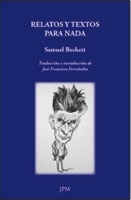
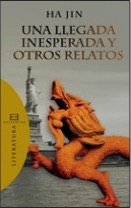
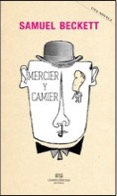
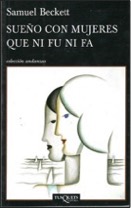
José Francisco Fernández Sánchez & Miguel Martínez Lage, translators
Sueño con mujeres que ni fu ni fa [Dream of Fair to Middling Women], by Samuel Beckett
Barcelona: Tusquets, 2011
ISBN: 978-84-8383-281-3
Samuel Beckett’s first novel was written in 1932 but not published until 1992, three years after the author’s death. In the words of David Pattie, “Dream has proved a fascinating site for those engaged in Beckettian archaeology; it does contain much in the way of relatively unvarnished autobiography”. The protagonist, Belacqua, acts as an alter ego of the author, recounting youthful experiences that Beckett himself had undergone. The three women of the title are young ladies with whom Beckett had some kind of sentimental attachment, one of them being James Joyce’s daughter, Lucia. This book, therefore, is an exceptional document from which to examine Samuel Beckett’s ideas at an early stage of his career, but it is also a highly experimental novel in which the author playfuly handled all the avant-garde techniques available to him at the time.


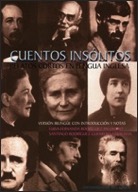
Santiago Rodríguez Guerrero-Strachan, translator
Daisy Miller. Otra vuelta de tuerca y otros relatos [Daisy Miller. The Turn of the Screw and other stories]
Madrid: Espasa-Calpe, 2005
ISBN: 84-670-2000-8
Dreamworld and Catastrophe. The Passing of Mass Utopia in East and West offers a reevaluation of the twentieth century. Buck-Morss argues that the disintegration of the former Soviet socialism marked the abandonment of the idea of mass utopia by both sides in the Cold War. One of the casualties of the end of that war was the shattering of dreamworld of industrialism, mass culture, and historical progress that gave meaning to collective social life in East and West. Susan Buck-Morss, American philosopher and intellectual historian, visited Moscow during events leading to the fall of the Soviet Union, working collaboratively with members of a new generation of philosophers who were developing an independent reading of Western theory (Adorno, Benjamin, Foucault). Buck-Morss is Professor of Political Science at the City University of New York Graduate Center. After the publication of Dialéctica de la mirada: Walter Benjamin y el proyecto de los pasajes (1996) [Dialectics of Seeing: Walter Benjamin and the Arcades Project] (1991), Mundo soñado y catástrofe became Buck-Morss’s second book to appear in Spanish.
José R. Ibáñez Ibáñez, translator
Mundo soñado y catástrofe. La desaparición de la utopía de masas en el Este y el Oeste [Dreamworld and Catastrophe. The Passing of Mass Utopia in East and West]
Madrid: Antonio Machado Libros, 2004
ISBN: 84-7774-639-7
Translations
This short story deals with the topic of love, as the title might suggest, but the author handles the problem from an unusual angle, far away from any idealization of the event of falling in love as it is usually presented in literature and film. The protagonist of the story, a destitute character, a tramp, falls in love with Lulu, a prostitute, and their love story is marked by incomprehension, although they offer each other a strange form of company. In this story Beckett was exploring different ways of loving as well as dismantling traditional representations of romantic relationships. The text also has a political reading, as the author took the opportunity to charge against the repressive morals of his country of birth, Ireland. The present translation into Spanish (the first time that the English version is taken as the source text) is accompanied by an introduction and an essay in which Beckett's conflicting feelings with Ireland are examined.
Samuel Beckett published his eighth novel, Comment c'est in 1961, and as he normally did with his novels and plays, he translated it himself into English. The novel in the author's mother tongue was published in 1964 with the title of How It Is, and this is the first time that the book is translated into Spanish from the English version. In this phantasmagoric narrative, an unnamed protagonist crawls in a vast expanse of mud carrying with him a sack containing a few tins. He hears a voice outside himself whose statements he consistently repeats. Embedded in that omnipresent discourse are episodes of his life from an idealised past that he has left behind and which he aspires to recover one day.
A Case in a Thousand (1934) by Samuel Beckett is a short story that had never been translated into Spanish. In this bilingual edition the original text is presented next to its Spanish version, both of them preceded by an introduction in which the main features of the narrative are exposed. Although we are dealing here with a brief narrative, A Case in a Thousand is not an easy text because there were hidden motives that impelled the author to write and publish this short story. The main issue at stake is the complicated relationship between Beckett and his mentor James Joyce. The author of Ulysses exerted a great influence on the young author and Beckett was fully aware that his writing needed desperately to break away from his influence. A Case in a Thousand is an attempt on the part of Beckett to come to terms with Joyce's ascendandy over him and to imagine ways to come out of his own impasse. Readers are invited then to read between the lines in this compelling story in which a young doctor has to face some unresolved traumas from his childhood. As it normally happens with Beckett, the solution is never clear cut and definitive.
Sean O'Faolain (1900-1991) is a well-known figure in contemporary Irish literature. He wrote novels, short stories and literary criticism and with the passing of time he became a major cultural figure in Irish society in the second half of the twentieth century. His book The Short Story (1948) had never been translated into Spanish and this edition is presented with an introduction by José Francisco Fernández. In The Short Story/El relato corto, O'Faolain reflects on the main features of the genre known as short fiction. The author taught literature at different universities, so his exposition is based on his practice as a lecturer. But he also was a practitioner of the short story, and this constitutes an enriching aspect of the book, as he combines the theoretical and the practical sides of the matter. The book offers engaging discussions on some of the most important writers of short stories, such as Alphonse Daudet, Anton Chekhov or Guy de Maupassant. In the last chapters O'Faolain offers some practical advice for writers of short stories.
Leticia de la Paz de Dios, translator
El relato corto [The Short Story], by Sean O'Faolain
José Francisco Fernández, editor
Almería: Editorial Universidad de Almería, 2020
ISBN: 978-84-17261-71-9

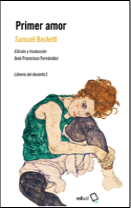
José Francisco Fernández, translator & editor
Primer amor [First Love] by Samuel Beckett
Almería: Editorial Universidad de Almería, 2017
ISBN: 978-84-16642-91-5
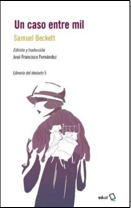
José Francisco Fernández, translator & editor
Un caso entre mil [A Case in a Thousand], by Samuel Beckett
Almería: Editorial Universidad de Almería, 2019
ISBN: 978-84-17261-43-6
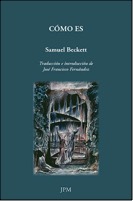
José Francisco Fernández, translator & editor
Cómo es [Comment c'est / How it is], by Samuel Beckett
Valencia: JPM, 2017
ISBN: 978-84-15499-48-0
Santiago Rodríguez Guerrero-Strachan, translator & editor
Días ejemplares [Specimen Days], by Walt Whitman
Biblioteca Javier Coy d'studis nord-americans
Valencia: Universitat de València, 2019
ISBN: 978-84-9134-484-1
Walt Whiman wrote Specimen Days with the purpose of putting on record those moment of his life lived at a very turbulent time in the history of the United States. On the occasion of a trip to the land of his ancestors, Whitman conceived an autobiographical project of which he had already written the part about the Civil War. He also used bits and pieces of his journalistic contributions that dealt with the journey he made to the west of the country and where he encountered the soul and energy of America. This edition presents, for the first time in Spain, the full text of the Whitman's Specimen Days and includes the childhood and youth years in Brooklyn, those years he spent as a volunteer in Washington hospitals during the Civil War, his sojourn in the countryside with the purpose of recovering from the hemiplegia he suffered and his journey to the West. The translation is accompanied by an introduction that aims to put Specimen Days into the historical and literary context of the time, as well as footnotes which provide the cultural, historical and textual background of Whitman's work.
As a representative of realism, Henry James was considered one of the most radical and subtle voices of his time. His fiction challenged such important institutions as the family, national identity and the emerging mass culture. In his stories he leaves scepticism in the face of the convoluted relations that govern every family, but also the dismantling of national identity through the comparison or confrontation of American and European cultures, as in the case of his most famous stories: "Daisy Miller", a moral fable in which he analyses social customs with cold rigour. This edition includes this novella as well as some of James's best-known narratives: "The Turn of the Screw," The Beast in the Jungle," and "The Jolly Corner". The editor is both the translator of all stories and of the introduction to Henry James's life and oeuvre.
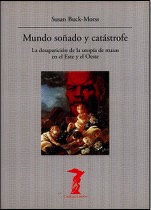
A new Spanish translation of Lessness/ Sans has been published by Árdora Ediciones in Madrid. The volume is novel in that it contains four versions of the same text: Beckett's original Sans (1969), followed by its translation into Spanish by Loreto Casado, and Beckett's original Lessness (1970), followed by its translation into Spanish by José Francisco Fernández. A highly experimental text such as this one, in which chance plays a major part in its composition, needed an innovative approach, as both translators explain: "The idea was to offer to the reader all the available options for the examination of this enigmatic poetic prose by Beckett. We considered it adequate that a text which is based on mathematical possibilities should be published in its four possible versions when rendered into a third language".
The book also contains an introduction by José Francisco Fernández, who acknowledged his debt of grant-aid from the Moore Institute for Research in the Humanities, National University of Ireland, Galway.
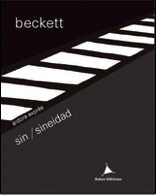
Loreto Casado, translator (French) & José Francisco Fernández, translator (English)
Sin/ sineidad [Lessness/ Sans], by Samuel Beckett
Madrid: Árdora Ediciones, 2021
ISBN: 978-84-88020-67-3
Watt (1953) is an experimental novel by Samuel Beckett. The book was mostly written in extraordinary circumstances, when the author was living in a small village in the years 1942-44. As a member of the Resistance, he had escaped from the Gestapo in Paris and moved to the south of France looking for a safe place to stay. During his period in hiding, he tried not to attract the attention of the authorities; he worked as a labourer during the day and at night he worked in the novel to occupy his mind. Much of the tension that he experienced in this period is indirectly transmitted into the plot itself, as the narrative reflects a world gone mad. The style of the novel seems also characterized by an obsessional, neurotic quality. The protagonist, a servant who enters the establishment of a Mr Knott, will make intense efforts to understand what is going on in his master’s property, to no avail. Despite this bleak prospect, the text is full of humour and dark comedy, a recurrent feature in most of Beckett’s books. The present translation consists of an introduction in which the context and main themes of the novel are presented, followed by the translation itself, accompanied by explanatory notes.
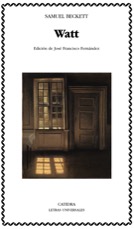
José Francisco Fernández, translator & editor
Watt [Watt], by Samuel Beckett
Madrid: Cátedra (Letras Universales), 2023
ISBN: 978-84-376-4666-4

José Francisco Fernández, editor
Verónica Membrive, translator
With explicative chapters by Germán Asensio Peral, Madalina Armie, Ángeles Jordán Soriano y Mar Garre García
Tormenta en España [Storm over Spain], by Mairin Mitchell
Salamanca: Ediciones Universidad de Salamanca, 2024
ISBN: 978-84-1311-930-4
Storm over Spain (1937), by Mairin Mitchell, is travelogue which narrates the journey of the author around Andalusia in the months before the beginning of the Civil War that erupted in Spain in July 1936. The author, an Irish journalist living in London at the time, offers a first-hand account of the atmosphere of tension and fear that preceded the Spanish war. During the months of April and May 1936, Mitchell and a friend moved around by train and bus visiting several cities in the southern region of Spain, including Seville, Ronda, Córdoba, Málaga, and Granada. They also stopped briefly at Gibraltar. Although Mitchell composed the bulk of the narrative soon after her return to London, she kept adding comments far beyond into 1937. This means that Mitchell was able to add the perspective of a year of war. She was thus able to incorporate into her chronicle the knowledge of the atrocities that she did not experience but which occurred in places that she had recently visited. The mixture of personal memories and the tragic events she read in newspapers after her return from Spain instils the narrative with a liminal, eerie atmosphere, as if her visit had been encapsulated in a deferred time, an extended period of disturbing quietness before the outbreak of the conflict. This is the first time the book is translated into Spanish and it contains a number of additional chapters in which the figure and times of Mairin Mitchell are properly contextualized.
